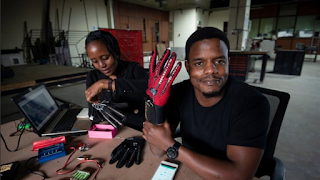25 Year Old African Invents Glove that Converts Sign language to Audio
 |
| Young African Inventor |
More than 30 million people around the globe have speech impairments and must rely on sign language, which poses a language barrier when seeking to communicate with non-sign language users.
It is something Roy Allela’s knows too well.
Roy Allela’s six-year-old niece was born deaf and found it extremely difficult to communicate with her family, none of whom knew sign language.
They say necessity is the mother of invention and the need to communicate and connect with her niece pushed 25-year-old Roy to invent smart gloves that convert sign language movements into audio speech.
Sign-io’s sign language to speech translation glove recognizes various letters signed by sign language users and transmits this data to an Android application where it is vocalized.
This feat saw Roy win admiration and recognition by the prestigious American Society of Mechanical Engineers (ASME), the world’s largest organization for mechanical engineers, during its prestigious 2017 ASME Innovation Showcase (ISHOW) competition.
Roy and two other African inventors – one from Uganda and Ghana – took home the Grand Prize in second of three regional showcase events.
Brian Gitta from Uganda who developed Matibabu, a noninvasive device used to test for Malaria, Charles Antipem from Ghana who created Science Set, an affordable, portable, practical and highly scalable science lab that can fit in the bag and on the desk of students and Roy Allela shared $500,000 in cash and in-kind prizes, along with three other winners in Bangalore, India, and three more in Washington, DC.
| Sign-io’s Founder Roy Allela (center) accepts his trophy from LR Kamau Gachigi |
The winners were among ten socially-minded hardware entrepreneurs who were selected among 150 applicants as finalist of the event, held at the Golden Tulip Westlands Nairobi Hotel, to present a range of devices designed to make a transformational economic, environmental, and social impact.
During the competition, the finalists appeared before a panel of judges, including successful entrepreneurs, academics, and founders of venture-funded startup companies, to pitch the engineering design attributes of their prototypes and outline their plans for manufacturing, implementation, marketing, and financing.
